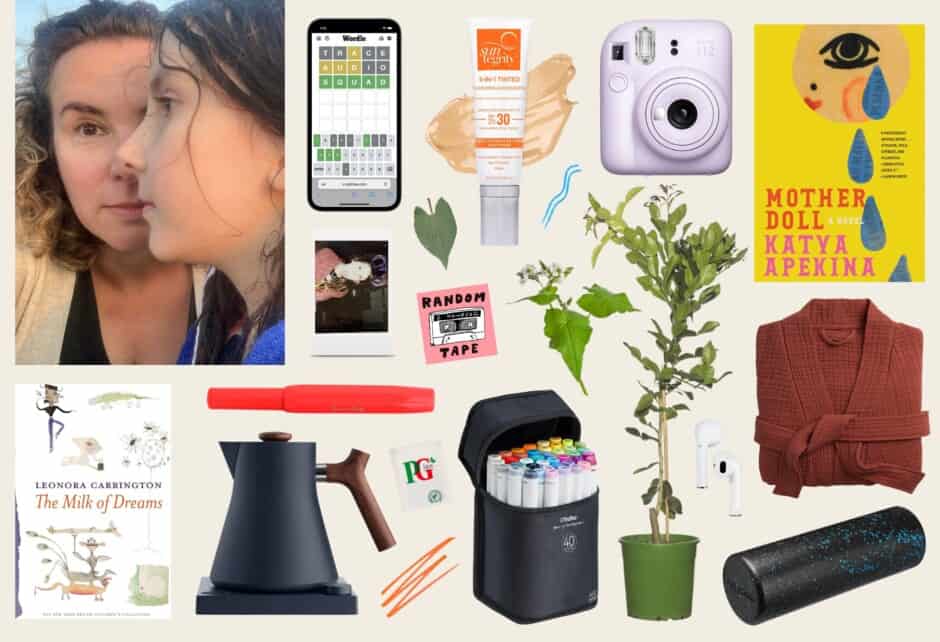
4 Happiness Habits To Teach Your Kids (And Practice Yourself)
Written by Katie Hintz-Zambrano
Photography by Anna Wallack, Photographed by VICTORIA OF MOTHERHOOD STORYBOOK
One goal that almost every parent can agree upon is that their kids grow up to be happy. But, as What Great Parents Do author Erica Reischer, PhD. explains: “Parents’ ideas of how to help kids be happy is often contrary to what decades’ worth of research shows really works to promote well-being.” In her book, which details “75 simple strategies for raising fantastic kids,” Reischer writes that happiness has three main dimensions—pleasure, engagement, and meaning—but that the first one, pleasure, is what’s most often pursued.
“We try to pick summer camps our kids will ‘like,’ offer them meals they ‘like,’ organize playdates with kids they ‘like,’ and so on. Over time, these repeated interactions can send kids the message that happiness is found in feeling good, having fun, and getting what they want,” she explains, adding that these happiness “boosts” end up being short-lived. Instead, she says, “if we want our kids to have the best chance of experiencing a happy and fulfilling life then we must teach them how to balance their preferences with what’s important, good, and meaningful.”
To do this, she breaks down four happiness habits that both kids and parents should practice.
1. Engagement.
What it is: “Engagement is the creative application of our skills to meet challenges. These activities often result in ‘flow,’ a total state of absorption in what we are doing,” writes Reischer. “A sense of timelessness while doing the activity and the possibility for an increasing level of challenge to match growing skills—these are the hallmarks of engaging activities.” For a child, various forms of play, sports, art, and mastering musical instruments might fall under this category. For adults, engaging work, as well as forms of grown-up play.
How to practice it: Make sure your child has enough time in his daily schedule for free, unstructured playtime. You can give suggestions, but ultimately let your child identify his “flow activity” (even if it’s not what you had in mind). And make sure to find a “flow activity” for yourself, too.
2. Meaning
What it is: “Meaning, also defined as ‘service,’ is using our abilities to contribute to the greater good,” explains Reischer. “When we strive for meaning, we are focused on pursuits that have a broader impact and purpose than our own personal goals and desires.” This, she writes, can lead to a deeper sense of happiness.
How to practice it: Encourage your kids to think about the world around themselves. Imagine activities that promote caring and kindness—from volunteering, to picking up trash in your neighborhood, to writing letters to lawmakers on an important issue, to planning a birthday party for another or writing a card to a loved one. The options are endless. Make sure you are choosing activities rooted in caring and compassion in your own life, too.
3. Gratitude
What it is: “Gratitude is counting your blessings, whatever they may be,” writes Reischer. “Practicing gratitude alleviates anxiety and depression and improves mental, emotional, and physical health.” It can also strengthen relationships (the number one contributor of happiness).
How to practice it: Develop a daily gratitude ritual—at dinner, at nighttime, whenever—in which all family members discuss what they are grateful for. Also: keeping a gratitude journal and regularly thanking others.
4. Exercise
What it is: We all know what exercise is. But one thing we often forget is just how important exercise is to both our physical health and mental health.
How to practice it: Make sure your children are given plenty of outdoor playtime and lots of opportunities to run around and get sweaty. Organized sports and walks or hikes with parents can be a part of the mix, too. Prioritizing regular movement—and sleep!—can do wonders for both parents and their offspring’s happiness.
For more tips from Reischer, check out her easy-to-follow book, What Great Parents Do.
For more Mother articles on the topic of happiness, be sure to read Raising Optimistic Kids, What Danish Parents Know About Teaching Empathy To Children, the Power Of Hygge, An Argument For Not Making Kids Share, How Danish Parents Raise The Happiest Kids In The World, and Teaching Kids Authenticity.
Share this story



